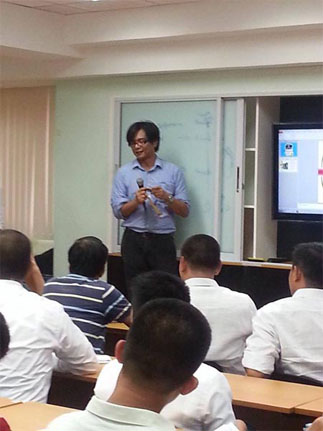by James Edgar T Sia
photo by Areiyne Yhêlle Baculio Hamac
 Preferring to simply be called “JJ” by his audience, philosophy professor Dr Jeremiah Joven B Joaquin of De La Salle University discussed what he called “a hotly-debated issue in philosophy” – the exact nature of philosophy itself.
Preferring to simply be called “JJ” by his audience, philosophy professor Dr Jeremiah Joven B Joaquin of De La Salle University discussed what he called “a hotly-debated issue in philosophy” – the exact nature of philosophy itself.
Described as “competent, accomplished, and well-known even outside the Philippines” by Philosophy Department chairperson Dr Jane D Gallamaso, Dr Joaquin accepted the department’s invitation to deliver a general lecture titled “Philosophy as Reasoned Analysis” at the Philosophy Majors’ General Assembly hosted by both the Philosophy Department and student organization Ateneo Philosophy Club (APC) on June 11 at AV8.
“We thought that having him speak would be a great way to start your school year,” said Philosophy instructor Ma Theresa G. Quiñones to students as she introduced Dr Joaquin. Current APC President Nikki Laurio concurred: “This is the first time we’ve included 1st year [students] in our G.A.,” she said, also commenting that it is the freshmen who stand to gain the most from the lecture, as they have no philosophy subjects to take during their very first semester as XU students.
Dr Joaquin, who specializes in Logic and whose main interests include Metaphysics and the Philosophy of Mind, delivered a 2-hour lecture on what he calls “Meta-philosophy,” which he defined as the exploration of the nature of philosophy itself. While admitting that philosophers throughout history may have differing and oftentimes conflicting notions of philosophy, Dr Joaquin demonstrated to his audience of students and philosophy instructors that, at its core, philosophy is something we do, specifically “a squaring of many conflicting ideas together.” As an exploration into the nature and interrelatedness of things, one does philosophy effectively by performing reasoned analysis: that is, asking questions and applying logical principles to determine whether an idea or argument is true or valid – analogous to solving a mathematical problem.
It is “looking for fundamental parts of things,” Dr Joaquin said.
The lecture was followed by an open forum wherein Dr Joaquin took questions from the audience. One student asked whether philosophical methods as described in the lecture could be used to combat real, pressing issues such as government corruption. “Yes,” Dr. Joaquin replied, explaining that he has worked with a multi-institutional team on a thorough analysis of corruption and discovered that certain practices widely regarded as corrupt, such as bribery, may not be perceived as such by parties concerned, who may have grown accustomed to giving and receiving “gifts.” Dr Joaquin said that, as a result of the study, behavioral cures for corrupt practices are being formulated for government offices.
Philosophy instructor and APC moderator Tyron Keith Sabal asked Dr Joaquin to comment on the rising academic trend of interdisciplinarity, which sometimes entails an “intermingling of philosophy and the empirical sciences.” Dr Joaquin replied that while he encourages it for one to gain a better perspective on a particular subject of interest by viewing it from multiple vantage points, he believes a wholehearted adoption of interdisciplinarity by philosophers would only water down philosophy as a field of study in and of itself. “Purist talaga ako about philosophy,” he said.
One philosophy student remarked that thanks to Dr Joaquin, their knowledge of philosophy “has been broadened.” Another described Dr Joaquin as a “good speaker,” referring to his casual, humorous, yet effective approach to discussing philosophy, a subject widely perceived to be serious and complex.